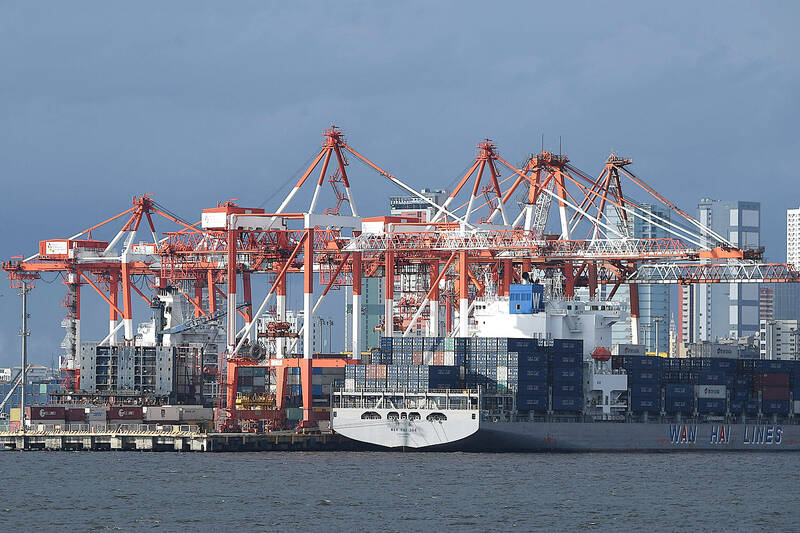The nation’s three major container shipping companies reported rising revenue and profit in the first half of this year on the back of higher freight rates amid ongoing disruptions in the Red Sea, and a better-than-expected rebound in cargo volumes from Asia to the US and Europe, the companies’ regulatory filings released this week showed.
The strong inventory restocking combined with capacity tightness has led to significant increases in freight rates throughout the first half of the year, with analysts expecting this momentum to continue this quarter due to factors such as seasonal cargo demand, port congestions and equipment shortages.
However, rising capacity boosts to the US West Coast, North Europe, Latin America and India in the coming month due to the introduction of more new vessels might limit freight rate growth in the fourth quarter, especially as the off-season approaches, analysts said.

Photo: AFP
Evergreen Marine Corp (長榮海運), the nation’s largest container shipping company in terms of fleet size, posted earnings per share of NT$21.86 in the first six months, far better than Yang Ming Marine Transport Corp’s (陽明海運) NT$6.66 and Wan Hai Lines Ltd’s (萬海航運) NT$5.77.
That came as Evergreen’s net profit increased 362.17 percent year-on-year to NT$46.84 billion (US$1.45 billion) during the January-to-June period, on revenue of NT$194.97 billion, which rose 45.27 percent from the same period a year earlier, the company reported on Tuesday, it said.
Gross margin increased to 28.12 percent, from 21.31 percent a year earlier, it added.
To meet rising operational needs, the company on Tuesday said its wholly-owned subsidiary, Evergreen Marine (Asia) Pte Ltd (長榮亞洲), would lease 223,301 units of containers from Gaining Enterprise SA for up to nine years at a total cost of US$369.62 million.
Yang Ming, the nation’s second-largest container shipper, on Monday reported that its net profit surged 611.28 percent year-on-year to NT$23.27 billion in the first half of the year as revenue jumped 33.87 percent to NT$96.39 billion from a year earlier, while gross margin increased to 27.72 percent from 9.68 percent last year over the same period.
Despite its impressive performance compared with the same period last year, Yang Ming warned that the global economic situation remains precarious amid persistent service inflation, trade tensions and geopolitical conflicts.
In addition, the slowing US economy and the upcoming US presidential election could add further uncertainties on the macroeconomic front, the company said.
Meanwhile, Wan Hai on Monday reported a profit of NT$11.57 billion last quarter, its highest in seven quarters, bringing its net profit in the first half to NT$16.19 billion. It posted net losses of NT$4.46 billion in the same period a year earlier.
First-half revenue grew 31.49 percent to NT$65.78 billion, while gross margin increased to 24.05 percent from minus-4.76 percent a year earlier, the company said.
While the third quarter is the peak season for back-to-school and pre-holiday stocking in Europe and the US, Wan Hai said the market is still full of challenges such as geopolitical tensions, supply chain disruptions and tariff barriers, warranting effective route management and cost control, it added.

Semiconductor shares in China surged yesterday after Reuters reported the US had ordered chipmaking giant Taiwan Semiconductor Manufacturing Co (TSMC, 台積電) to halt shipments of advanced chips to Chinese customers, which investors believe could accelerate Beijing’s self-reliance efforts. TSMC yesterday started to suspend shipments of certain sophisticated chips to some Chinese clients after receiving a letter from the US Department of Commerce imposing export restrictions on those products, Reuters reported on Sunday, citing an unnamed source. The US imposed export restrictions on TSMC’s 7-nanometer or more advanced designs, Reuters reported. Investors figured that would encourage authorities to support China’s industry and bought shares

TECH WAR CONTINUES: The suspension of TSMC AI chips and GPUs would be a heavy blow to China’s chip designers and would affect its competitive edge Taiwan Semiconductor Manufacturing Co (TSMC, 台積電), the world’s biggest contract chipmaker, is reportedly to halt supply of artificial intelligence (AI) chips and graphics processing units (GPUs) made on 7-nanometer or more advanced process technologies from next week in order to comply with US Department of Commerce rules. TSMC has sent e-mails to its Chinese AI customers, informing them about the suspension starting on Monday, Chinese online news outlet Ijiwei.com (愛集微) reported yesterday. The US Department of Commerce has not formally unveiled further semiconductor measures against China yet. “TSMC does not comment on market rumors. TSMC is a law-abiding company and we are

FLEXIBLE: Taiwan can develop its own ground station equipment, and has highly competitive manufacturers and suppliers with diversified production, the MOEA said The Ministry of Economic Affairs (MOEA) yesterday disputed reports that suppliers to US-based Space Exploration Technologies Corp (SpaceX) had been asked to move production out of Taiwan. Reuters had reported on Tuesday last week that Elon Musk-owned SpaceX had asked their manufacturers to produce outside of Taiwan given geopolitical risks and that at least one Taiwanese supplier had been pushed to relocate production to Vietnam. SpaceX’s requests place a renewed focus on the contentious relationship Musk has had with Taiwan, especially after he said last year that Taiwan is an “integral part” of China, sparking sharp criticism from Taiwanese authorities. The ministry said

US President Joe Biden’s administration is racing to complete CHIPS and Science Act agreements with companies such as Intel Corp and Samsung Electronics Co, aiming to shore up one of its signature initiatives before US president-elect Donald Trump enters the White House. The US Department of Commerce has allocated more than 90 percent of the US$39 billion in grants under the act, a landmark law enacted in 2022 designed to rebuild the domestic chip industry. However, the agency has only announced one binding agreement so far. The next two months would prove critical for more than 20 companies still in the process